
SGLT2 inhibitors are a relatively new class of type 2 diabetes drugs. They work by reducing the amount of glucose reabsorbed in the kidneys and directing that excess blood sugar to be eliminated through urine. As a result of this caloric decrease, SGLT2 inhibitor users often experience “beneficial” weight-loss and blood pressure–reduction side effects, an aspect of the treatment that has not gone unmentioned in advertisements. But while pharmaceutical companies underscore the perks of these pills, medical experts continue to worry about their primary mechanisms. Why, for instance, have multiple studies revealed a connection between SGLT2 inhibitor use and diabetic ketoacidosis?
With its new study, Janssen Pharmaceutica has focused not so much on the why but on the whether. According to the authors, among the 17,956 patients analyzed, only 10 (less than a tenth of a percent) experienced “serious adverse events of DKA and related events” after taking Invokana. Further, the company claims, most of these patients presented as hyperglycemic—that is, their blood sugar was significantly higher than normal levels. This is opposed to the recent trend of patients who present with diabetic ketoacidosis after using an SGLT2 inhibitor and have relatively normal (or euglycemic) blood sugar levels. In any case, the authors claim that this rate of diagnosis is “consistent with limited existing observational data in the general population with type 2 diabetes.”
Janssen’s study makes no mention of diabetic ketoacidosis in Type I diabetic patients who are using SGLT2 inhibitors off-label. Reports from practitioners and medical experts suggest SGLT2 inhibitors may be more problematic in these cases, resulting in misdiagnosis or delayed treatment. More research will likely be made available in the near future, once the FDA and Health Canada have concluded their investigations into SGLT2 inhibitors and diabetic ketoacidosis.
Talk to your doctor before stopping or starting any diabetes medication. If you or a loved one was diagnosed with diabetic ketoacidosis after using an SGLT2 inhibitor, contact the lawyers at Lopez McHugh now to receive a free consultation. You may be entitled to legal compensation through a ketoacidosis lawsuit.
